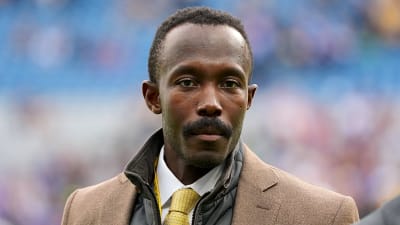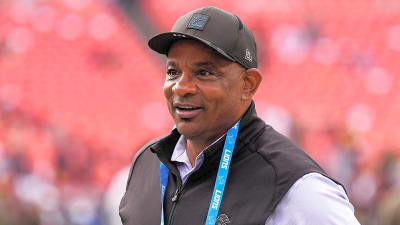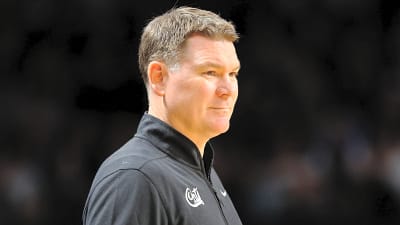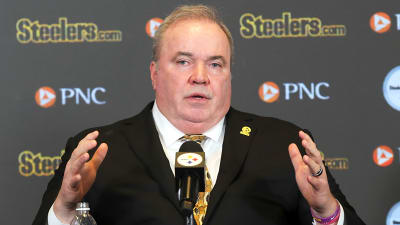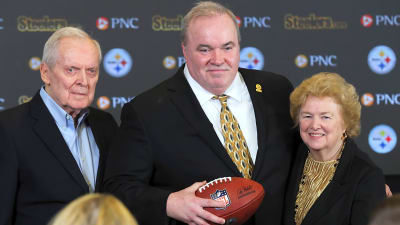With the evolution of the college football postseason from bowls to the Bowl Championship Series to the College Football Playoff, going undefeated has become a more prestigious feat. Here are the last 25 undefeated Division I college football teams, dating back to the 1994 season.
2017: Central Florida (13-0)
Brett Davis / USA Today Sports Images
Head coach Scott Frost's team went a perfect 13-0 but wasn't picked for the College Football Playoff. Despite that fact, the Knights managed to beat Auburn in the Peach Bowl and were self-proclaimed National Champs, championship banner included. The team finished the year first in scoring with 48.2 points per game, led by quarterback McKenzie Milton.
2013: Florida State (14-0)
Harry How / Getty Images
The dominant Seminoles squad won the BCS Championship after defeating Auburn 34-31. Led by quarterback Jameis Winston, the team was second in college football with 51.6 points per game and was first in scoring defense, allowing only 12.1 points per game.
2012: Ohio State (12-0)
Jamie Sabau / Getty Images
The 2012 Buckeyes squad was ineligible for postseason play due to NCAA infractions but still managed to go 12-0 during the regular season and finish third in the final AP Poll in Urban Meyer's first season as head coach. Quarterback Braxton Miller led the offense with 2,039 yards passing and 1,271 yards rushing.
2010: Auburn (14-0)
NCAA Photos / Getty Images
Led by Heisman Trophy winner Cam Newton, the Tigers went undefeated and won the BCS Championship Game over Oregon 22-19. Newton had a tremendous season with 30 touchdown passes and 20 more touchdowns on the ground.
2010: TCU (13-0)
Tom Pennington / Getty Images
TCU was a perfect 13-0 but failed to qualify for the BCS National Championship, finishing behind Auburn and Oregon in the rankings. The Horned Frogs were dominant on offense and defense, finishing fourth in points scored per game, led by quarterback Andy Dalton, and first in points allowed per game. However, Gary Patterson's squad was penalized for its soft schedule in the Mountain West Conference.
2009: Alabama (14-0)
Stephen Dunn / Getty Images
Nick Saban won his first BCS National Championship since taking the Alabama job in 2007, producing a perfect 14-0 record with a dominant defense that allowed only 11.7 points per game. The team defeated Texas in the BCS Championship 37-21, led on offense by Heisman running back Mark Ingram.
2009: Boise State (14-0)
Icon Sports Wire / Getty Images
Boise put together its second undefeated season in four years but still ranked only sixth in the final BCS Rankings due to a weak schedule. The team finished second in college football with 42.2 points per game, as quarterback Kellen Moore was ultra-efficient with 39/3 TD/INT.
2008: Utah (13-0)
Jonathan Ferrey / Getty Images
Kyle Whittingham's team ascended to a perfect 13-0 in his fourth full season as head coach. The team defeated Alabama in the Sugar Bowl but still finished fifth in the final BCS Rankings.
2006: Boise State (13-0)
Steve Grayson / WireImage / Getty Images
Head coach Chris Petersen went undefeated in his first season leading the Broncos, with a tremendous offense that finished second in college football with 39.7 points per game. The team upset Oklahoma 43-42 in the Fiesta Bowl, still considered one of the most shocking bowl game upsets ever, and finished the year fifth in the AP Poll.
2005: Texas (13-0)
Kirby Lee / WireImage / Getty Images
Texas went 13-0 and won arguably the best National Championship game ever, defeating USC 41-38 with the help of quarterback Vince Young. The team led the country in scoring with 50.2 points per game, with a prolific rushing attack between Young and Jamaal Charles.
2004: Utah (12-0)
Ken Levine / Getty Images
Head coach Urban Meyer completed his second year at Utah before heading to Florida 12-0, finishing fourth in the AP Poll. The offense ranked third in the country with 45.3 points per game, as quarterback Alex Smith had 32/4 TD/INT.
2004: USC (13-0)
Jamie Squire / Getty Images
After being left out of the BCS National Championship in 2003, the Trojans finished the job in 2004 after blowing out Oklahoma 55-19 in the Orange Bowl. The team finished top six in scoring and points allowed and were led on offense by quarterback Matt Leinart and the thunder-and-lightning running back duo of Lendale White and Reggie Bush. The team was forced to vacate its final two wins, including the BCS Championship Game, after it was found to have committed NCAA violations.
2004: Auburn (13-0)
Chris Graythen / Getty Images
Auburn was 12-0 after winning the SEC Championship Game but still trailed USC and Oklahoma in the BCS Rankings. The Tigers went on to beat Virginia Tech 16-13 in the Sugar Bowl, with a defense that allowed only 11.3 points per game, best in the nation. The offense also had plenty of talent, led by quarterback Jason Campbell and the running back duo of Carnell "Cadillac" Williams and Ronnie Brown.
2002: Ohio State (2002)
NCAA Photos / Getty Images
The Buckeyes were a perfect 14-0 and won the BCS National Championship after a 31-24 upset victory over Miami in the Fiesta Bowl. The team allowed only 13.1 points per game, second best in the country, and were led on offense by freshman running back Maurice Clarett's 1,237 rushing yards and 18 touchdowns.
2001: Miami (12-0)
Jon Soohoo / WireImage / Getty Images
The Hurricanes were a perfect 12-0 with what's considered to be arguably the most talented college football team ever en route to a National Championship. The team finished third with 42.7 points scored and first in points allowed with only 9.8 per game. The backfield had three future NFL star running backs in Clinton Portis, Willis McGahee and Frank Gore, and Andre Johnson, Jeremy Shockey and Kellen Winslow Jr. were among the receiving options. The defense also had future NFL stars Ed Reed, Jonathan Vilma, Vince Wilfork and Antrel Rolle as regular contributors.
2000: Oklahoma (2000)
Brian Bahr / Getty Images
Head coach Bob Stoops went undefeated in only his second season at Oklahoma, finishing off its National Championship campaign with a 13-2 win over Florida State in the Orange Bowl. Quarterback Josh Heupel finished the year with 3,606 passing yards and 20 touchdowns.
1999: Florida State (13-0)
Andy Lyons / Getty Images
The Seminoles won their second National Championship of the decade under head coach Bobby Bowden with a perfect 13-0 season. The team scored 38.2 points per game, third most in the country, as quarterback Chris Weinke threw for 3,103 yards and 25 touchdowns.
1999: Marshall (13-0)
Robert Laberge / Getty Images
Marshall went undefeated after finishing 1998 with only one loss. Star quarterback Chad Pennington threw for 3,799 yards and 37 touchdowns, and led the team to a Motor City Bowl win over BYU. The team finished the year 10th in the AP Poll.
1998: Tennessee (13-0)
Andy Lyons / Getty Images
Peyton Manning left Tennessee for the NFL following the 1997 season, but the team ascended to win a National Championship the following year behind quarterback Tee Martin and a terrific running game. The Vols defeated Florida State 23-16 in the Fiesta Bowl, with a running back depth chart that included Travis Henry and Jamal Lewis.
1998: Tulane (12-0)
Stephen Dunn / Getty Images
Tulane finished its perfect season seventh in the AP Poll after beating BYU 41-27 in the Liberty Bowl. The team was second in the country in scoring with 45.0 points per game, as quarterback Shaun King threw 38 touchdowns and ran for 11 scores.
1997: Nebraska (13-0)
Brian Bahr / Getty Images
The undefeated Cornhuskers finished the 1997 season first in the Coaches Poll but second in the AP Poll behind Michigan, which also went undefeated. Tom Osborne's team led the country with 46.7 points per game behind dynamic quarterback Scott Frost and running back Ahman Green, who finished with 1,877 yards rushing and 22 touchdowns.
1997: Michigan (12-0)
Sporting News Archive / Getty Images
The Wolverines finished the 1997 season No. 1 in the AP Poll but behind Nebraska in the Coaches Poll. Heisman Trophy winner Charles Woodson starred for the team as a cornerback, wideout and punt returner, and quarterback Brian Griese led the team with another quarterback named Tom Brady sitting on the bench behind him.
1995: Nebraska (12-0)
Sporting News Archive / Getty Images
Nebraska completed its second straight undefeated season and National Championship with a 62-24 Fiesta Bowl win over Florida. The team led the country with 53.4 points per game, as All-American quarterback Tommie Frazier had 17 passing scores and 14 more on the ground. Running backs Ahman Green and Lawrence Phillips each averaged 7.7 yards per carry.
1994: Nebraska (13-0)
Mitchell Layton / Getty Images
Nebraska was one of two undefeated teams in 1994 but finished ranked ahead of 12-0 Penn State in both polls. The team finished eighth in points per game with a huge season from running back Lawrence Phillips, who had 1,722 yards rushing and 16 touchdowns.
1994: Penn State (12-0)
Doug Pensinger / Getty Images
Head coach Joe Paterno completed the fifth undefeated season of his career at Penn State, but the Nittany Lions still finished the year No. 2 in the polls behind Nebraska. Penn State did lead the country with 47.0 points per game, as future NFL first-round quarterback Kerry Collins threw for 2,679 and 21 touchdowns, and first-round running back Ki-Jana Carter ran for 1,539 yards and 23 touchdowns.

 +
+

























